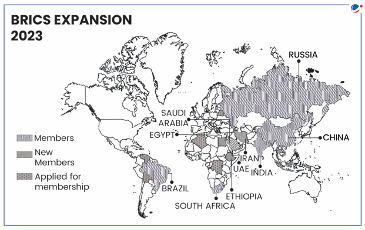Why in the news?
Recently, five new members namely Egypt, Ethiopia, Iran, Saudi Arabia, and the United Arab Emirates have joined BRICS as full time permanent members. However, Argentina has withdrawn.

About BRICS
- British economist Jim O’ Neill coined and used the acronym ‘BRICs’ for the first time in 2001.
- BRIC started functioning as a formal grouping on the margins of G8 Outreach Summit in 2006.
- First BRIC Summit was held in Yekaterinburg (Russia) in 2009.
- BRIC became BRICS with the inclusion of South Africa in 2010.
Major Initiatives of BRICS
|
Significance of BRICS Expansion
- Shaping a multipolar world: Expansion of BRICS with diverse regions and economic powerhouses makes it a key player in global order.
- BRICS offers a subtle shift towards a world order, where middle powers are increasingly assuming central roles.
- Expand the group's footprint in the new regions: Expansion consolidates the BRICS' presence in key regions, including the Middle East, Africa, and South America, further enhancing its global footprint.
- Increased influence in the global economy: BRICS nations now comprise more than 40% of the world's population have surpassed the G7 countries in terms of purchasing power parity.
- Addition of Egypt and Ethiopia of the African continent will further lead to global economic inclusivity.
- Push towards de-dollarization: Egypt has shared its intent to conduct payments for imports from China, India, and Russia in their respective currencies.
Issues in Expansion of BRICS
- Different levels of development as the added BRICS countries differ significantly in terms of economic development and the expansion may further limit the cooperation among them.
- Lack of consensus building and extensive dialogue among member states as some countries were not in favour of expansion and insisted on establishment of well-defined criteria for addition of new members.
- Still at developing stage as the grouping is yet to evolve as an organization and needs time to develop its institutions and governance structure.
- Geopolitically, many countries view expansion as China’s move to increase its sphere of influence by bringing in more like-minded countries.
- Vast internal differences among members: The grouping has mix of democratic and authoritarian regimes, with different social structures, resource and developmental trajectories.
- Approach towards institutional reforms such as at UNSC remains more declaratory in nature.
- Dependency on global institutions: BRICS countries are still dependent on other international organisations such as G20,IMF, World Bank etc.
- On-going global conflicts and changing world order: The on-going churn in the world order, further complicated by the pandemic, Russia Ukraine conflict and Israel-Hamas war raises concerns about future policy directions of BRICS member.
- Low Intra-country trade, imports and exports among BRICS nations are low due to geographical distance and restrictive trade environments.
- Lack of capital as BRICS lacks funds to compete with Institutions such as World Bank and IMF which necessitates for more capital in the NDB.
Significance of BRICS for India
|
Way Forward
- Setting up of a permanent secretariat with its expanded membership.
- Collective stand against trade protectionism as future of BRICS will depend on how much the leaders have agreed to stand collectively against trade protectionism, increase investments and share a global political agenda.
- Socioeconomic convergence among the existing member countries must prioritize economic and social cohesion among themselves.
- Following bottom-up approach can lead to increase in participation of private sector and citizen involvement. It can include single BRICS visa, increased collaboration among researchers etc.
- Members should focus on building trust by sharing knowledge, promoting trade and development, and advancing developmental finance.
- Push for much enhanced multilateral efforts by furthering its deep connects with the Global South and send a global message of unity and not of polarisation
- Further expansion of objectives such as creation of a BRICS Space Exploration Consortium, establishing a repository of traditional medicine etc.
Related News IBSA facility for poverty and hunger alleviation (IBSA Fund)
|



